Film Name:銀翼殺手2049 / Blade Runner 2049
In my view, great films—especially sci-fi ones—fall into two categories: those that challenge, subvert, and refresh viewers’ existing understanding, leaving them in awe that “it can actually be done this way”; and those that build upon that understanding to deliver broader, more refined experiences, making audiences marvel that “it can also be done this way.”
The 1982 “Blade Runner” belongs to the former category, while the 2017 “Blade Runner 2049” belongs to the latter.
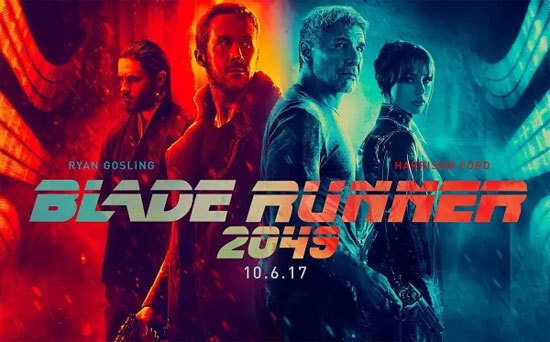
The significance of “Blade Runner” lies largely in its opening up of the “cyberpunk” genre and elevating the philosophical debate about the humanity of artificial intelligence to an entirely new, unprecedented height…
Making a sequel to this film was no easy feat, but—with Denis Villeneuve directing, Ridley Scott producing (granting the director full creative freedom), Roger Deakins handling cinematography, and Hans Zimmer contributing to the score… even setting aside the story, the sheer talent and design alone ensured Blade Runner 2049 was destined for greatness.
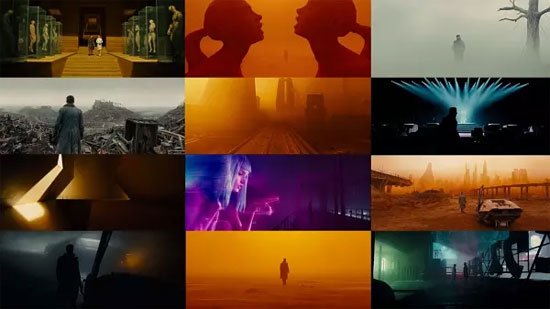
Surreal lobbies, statues that seem to hold back words, farms shrouded in mist, mountains covered in trash, ghost towns glimpsed through haze, dance floors where light and shadow dance, eerie, enigmatic dark rooms, phantom figures like dreams, ruins sinking into deathly silence, mist-shrouded dams, endless wastelands, and rain-drenched cities… Just when one scene leaves you awestruck, another unfolds before you.
In my mind, this year’s best film has been decided.
[Friendly reminder: The following content contains spoilers.]
The creative team is incredibly talented, the three prequel shorts effectively bridge the gap between the two films, and Blade Runner 2049 both inherits and reimagines its predecessor—these points have been thoroughly discussed elsewhere. I’ll focus on just one aspect that captured my attention during the screening: those haunting, lingering, unforgettable gazes.
The eyes are the windows to the soul, and in this film series, they are the windows to the very essence of humanity—the ultimate proof distinguishing humans from replicants.
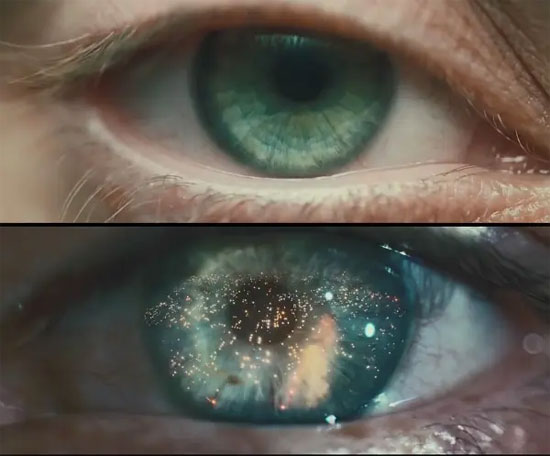
(Blade Runner 2049 and Blade Runner)
Distinguishing Nexus-8 replicants like Sabre Morton is relatively straightforward, as their right eyes bear a distinctive serial code. However, Nexus-9 replicants like K, portrayed by Commander High, lack even this identifying feature.
—The crux lies not here, but in the emotional depth conveyed through the characters’ gazes. Observing these expressions essentially reveals the film’s entire narrative.
With the film’s predominantly steady, quiet, and lingering shots, the actors’ mastery of facial expressions and body language is put to greater test, amplifying their personal charisma—particularly their gaze.
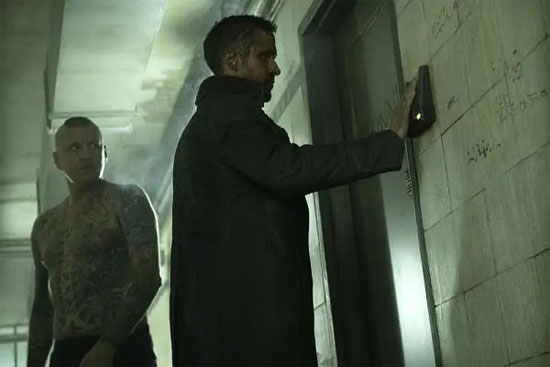
For a long time, K diligently performed his duties as a Blade Runner. He knew his replicant identity and dared not indulge in unnecessary human-like emotions. His belief that “replicants are manufactured without souls, while humans are born with them” reveals his subconscious conviction that humans are superior to replicants. In the early stages, K’s gaze remains perpetually calm, emotionless, and unruffled.
While holding onto this conviction, K inevitably develops a longing for a “soul”… Standing directly opposite him is his superior, Lieutenant Joshi.
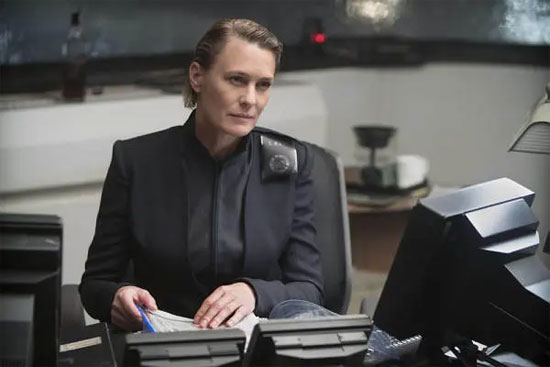
Ruling her subordinates with an iron fist, Joshi acted with decisive efficiency, never allowing emotion to cloud her judgment. “Aren’t you doing just fine without a soul?” In her words, Joshi even seemed to envy K’s detached calm and lack of attachments—her own gaze was far more expressive, though it was clear she was striving to become as unreadable as K…
Privately, however, she was fascinated by K’s memories and emotions. She was captivated by the replicants’ precise, efficient nature—including the “design to make them more human.”
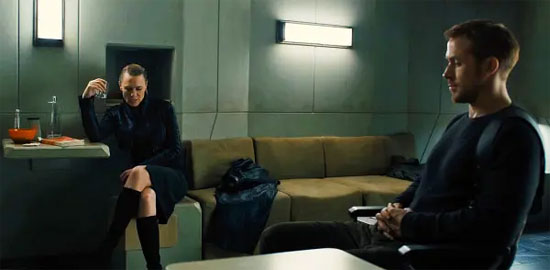
On the same level yet in a different dimension as Josh was the replicant Leah. As a key operative under the big boss Wallace, she was completely immersed in her authentic identity, never displaying obvious emotional fluctuations. Her gaze remained unchanging—essentially expressionless…
Even so, Leah couldn’t suppress her physiological and psychological “primitive impulses.” In the film, she shed tears twice.
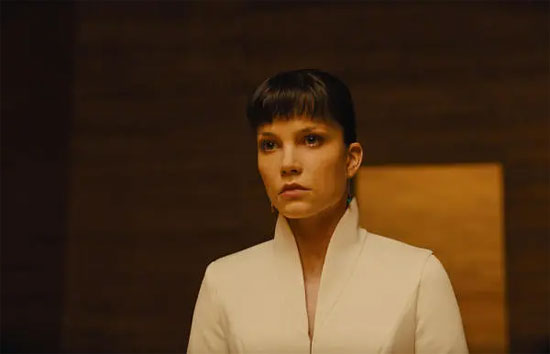
The first time was when Wallace tested and stabbed the experimental clone to death right before her eyes. Luff stood motionless behind him, yet tears welled up unconsciously—a fear born of her creator.
The second time was when she sought Josh for clues about K’s whereabouts. Having easily subdued him, she declared, “We (replicants) don’t lie,” only to immediately add, “I can say you forced my hand.” Tears fell again as she killed Josh—likely stemming from her astonishment at her own cunning, deceit, and darkness, traits she associated with humans…
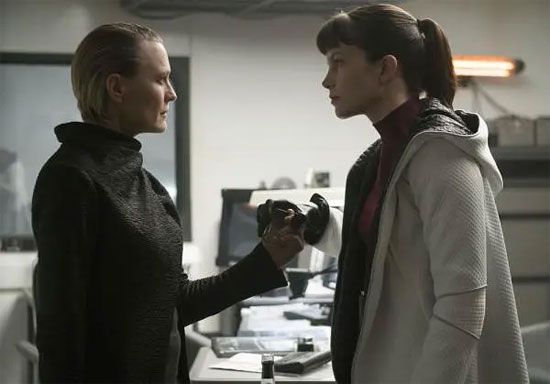
Even at the moment of her death, Rogue’s gaze showed little change. She took pride in her replicant identity and consistently resisted her own humanizing progression.
More intriguing—and blasphemous—were the glances exchanged between Joi, K, and Mariette. Human-replicant romance was nothing new, but now replicants were falling for virtual projections… …
Though neither human, Joy was far more “human-like” than K. She embodied the ideal girlfriend in most men’s eyes, her gaze perpetually brimming with affection for K—sometimes mischievously playful, other times dreamily intoxicated… Yet all this was merely programmed “humanity.”
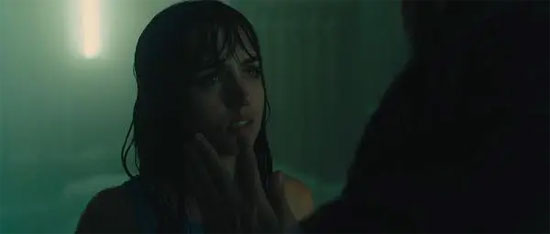
The most agonizing “doubts” for viewers stem from Joy’s devotion to K. When she cheers wildly at the chance to accompany her boyfriend outdoors, when she “feels” raindrops and longs to kiss him, when she urges him to embrace a different fate—it’s impossible to believe any of it is fake.
The physical intimacy Joy could never achieve in her lifetime, the “streetwalker” Mariette could effortlessly provide… And so, one day, Mariette visited K’s room.
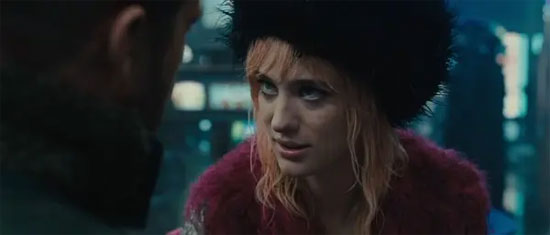
With such playful, teasing eyes, anyone would assume she was an ordinary human. Yet Mariette, too, was a replicant.
The scene where Joey and Mariette both copulate with K stands as the film’s most unforgettable moment, leaving an indelible impression on me. For the two “people” could never achieve perfect synchronization, especially when kissing K: Joey tilted her head slightly, eyes tightly closed, like a young girl tasting love for the first time, tenderly touching her lover’s lips and teeth. Mariette, however, kept her eyes wide open, wearing an expression of curiosity, like a seasoned veteran of romance, amusedly studying her partner’s features…
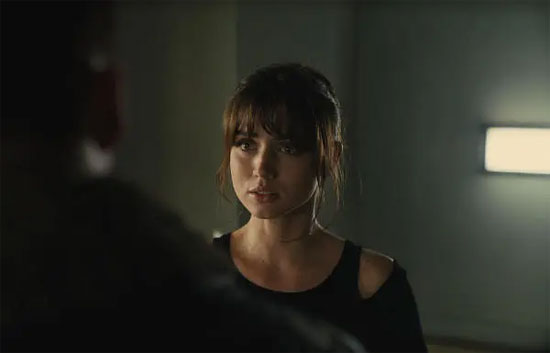
Which one is real? Both are. Before K stood two girlfriends—one illusory, one tangible; one genuine, one fake. Both possessed eyes brimming with human emotion, even though neither was truly human.
With these two sets of “triangular relationships” as a foundation, one discovers that replicants are increasingly resembling humans—whether intentionally or not—while humans are driving themselves to become more machine-like.
Upon learning K’s identity, the junkyard’s “Mr. Cotton” mistakenly believes he’s trouble. He immediately becomes frantic, babbling incoherently, unable to meet anyone’s gaze, his eyes completely vacant. This state persists until he’s coerced into fulfilling his mission…

Coincidentally, actor Lennie James’ character Morgan in “The Walking Dead” had previously exhibited a similar deranged state. Both characters share a common thread: they “don’t seem human.”
Even more typical is the big boss, Niard Wallace. He takes it to another level because he’s blind (actor Jared Leto even wore opaque contact lenses that blocked vision for the role)… However, Wallace possesses many “eyes,” granting him a far broader vision than the pair attached to his body.

When designing the Alien, its eyes were deliberately removed because “eyes betray the soul; without them, no one can predict its next move.”… Wallace is the same—he has no gaze.
Ultimately, the gazes of the old and new Blade Runners are comparatively easier to interpret.
Deckard initially believed K had come to hunt him down, leaving no room for communication between them. Even after realizing he was no match for K and agreeing to share a drink, his eyes still betrayed wariness and confusion.
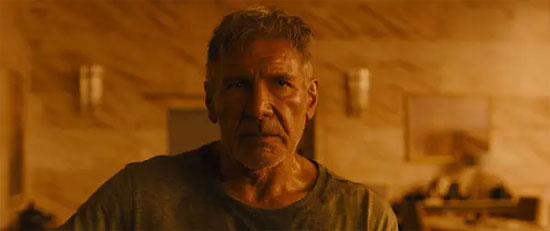
K’s (or should we say “Joe”?) transformation was far more intriguing. By this point, he had gradually come to believe he was the child born to the replicant, beginning to accept he possessed a soul. He no longer suppressed the emotions and feelings that had long welled up within him… So when he looked at the man before him—who might be his “father”—his eyes brimmed with curiosity and hope.
In the first half, Commander Goh mostly maintained a level or downward gaze, his eyes rarely focused. But here, as he looked at Deckard, the “brightness” in his eyes intensified, becoming more “lively.”

When all was settled, Joe brought the “dead” Deckard to his true child. Having long been detached from humanity, Deckard’s prejudice toward the Nexus-9 was completely overturned. Of course, this wasn’t the only emotion revealed in his eyes—there was also bewilderment at the prospect of finally seeing his child without reservation, and an eager anticipation…

Over thirty years have passed like a dream, and Decard is about to enter the next phase of life he has never experienced.
Joe, meanwhile, has undergone a psychological reversal from “replicant to human to replicant.” This journey was far from futile; he has ultimately embraced the idea that “replicants can possess love, hatred, joy, and sorrow just like humans.” Now, his brows slightly furrowed, his gaze fixed on the snowflake melting in his warm hand, he appears deeply contemplative—much like the first time Joey stepped into the rain curtain to feel the raindrops…

I choose to believe that Joey’s desire and attempt to touch the rain were genuine, just as I believe Joe’s current emotions are real and deeply felt.
I’ll conclude this piece with a friend’s words:
Maybe Joe died, maybe not.If he died, he died as a human. Furthermore , as an angle.
Please specify:Anime Phone Cases » Blade Runner 2049 銀翼殺手2049 2017 Film Review: A whole play was conveyed with just a glance.